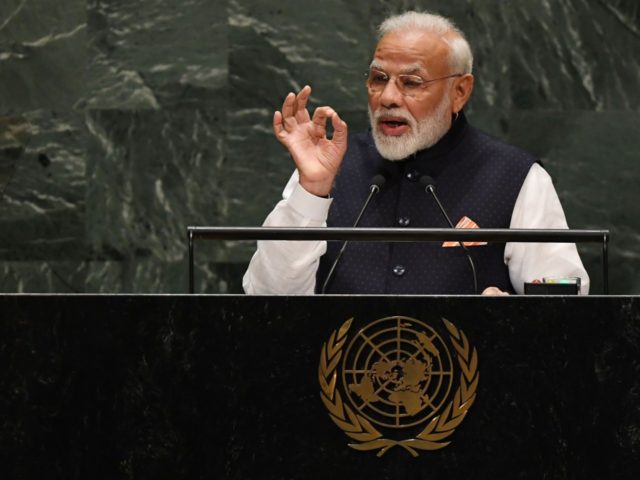Indian Prime Minister Narendra Modi dedicated his speech before the United Nations General Assembly on Friday to urging globalism and “multilateralism,” arguing that India has a “unique” understanding of “belonging beyond borders.”
Modi notably did not address the most pressing international dispute that his country is currently facing: his annexation of disputed territories of Kashmir, which have triggered accusations of preparing for “genocide” from his Pakistani counterpart, Imran Khan.
Addressing the @UN General Assembly. Watch. https://t.co/N7J54af30s
— Narendra Modi (@narendramodi) September 27, 2019
Instead, he chose to tell the world about the advances he considered his government should be celebrated for, and to herald the democratic values of his country.
“[India] experienced the world’s biggest election. In the world’s biggest democracy, the highest ever number of voters voted my government into power for a second term, with an even stronger mandate than before, and it is thanks to this mandate that I am standing here before you once again,” Modi told the audience. “However, the message that this mandate conveys has an even greater significance – a wider and more inspiring one.”
Modi described that mandate as one of both helping India advance out of the developing nation stage and of helping the world advance in security issues, counter-terrorism, and climate change. Like many world leaders this year, he firmly made the argument that “India’s contribution to global warming is very low. However, India is one of the leading nations when it comes to taking steps to addressing this issue.”
Modi did not note that India has some of the world’s worst air quality, contributes significantly to plastic waste, and is, by some metrics, the world’s most polluted country. It is important to note that many metrics used by international environmental experts rely on statistics from untrustworthy nations such as China, which has actively fabricated data to appear cleaner than it is.
He kept much of his address generalized, however, discussing the philosophy of “multilateralism” rather than ordering the United Nations to act in any particular way.
“All our endeavors are centered around 1.3 billion Indians, but the dreams that these efforts are trying to fulfill are the same dreams that the entire world has, that the entire country has, and that every society has,” he declared. “The efforts are ours, but the fruits are for all.”
Citing a 3,000-year-old Indian philosopher, Modi said of his people, “we belong to all places and we belong to everyone.”
“This sense of belonging beyond borders is unique to India,” Modi said. “In the last five years, India has worked towards strengthening its centuries-old great tradition of fraternity among nations and working for the welfare of the world, which is indeed in line with the key objectives of the United Nations. The issues that India raises, the kind of new global platforms that India has come forward to build seek collective efforts to address serious global challenges and issues.”
Modi did not address Pakistan, his country’s neighbor and rival, but appeared to demand that Pakistan do more to eradicate jihadists in its rural regions by urging the world to unite against terrorism. The Afghanistan/Pakistan border is considered home to the highest concentration of terrorist organizations in the world, and Modi’s government often accuses Prime Minister Khan of not doing enough to eradicate them.
“The lack of unanimity amongst us on the issue of terrorism dents those very principles that are the basis for the creation of the U.N. and that is why, for the sake of humanity, I firmly believe that it is absolutely imperative that the world unites against terrorism,” Modi said at the United Nations. “[T]he face of the world is changing today. Modern technology in the 21st century is bringing about sweep changes in social life, personal life, economy, security, connectivity, and in international relations.”
“In such a situation, a fragmented world is in the interest of no one,” he continued. “Neither do we have the option to confine ourselves within our boundaries. In this new era, we will have to give new direction to multilateralism and to the United Nations.”
Modi’s government revoked the autonomy of Indian-held Kashmir in August, stripping disputed areas that Pakistan and China both claim from their governments. Kashmir is a Muslim-majority area and home to various separatist groups that urge either annexation by Pakistan or full independence to establish a Muslim state. Modi argued following the move that it was necessary to curb the operation of terrorist organizations that the autonomous government had allowed to exist in the region.
Friends, I have full belief that we will be able to free Jammu and Kashmir from terrorism and separatism under this (new) system,” Modi said at the time. “I have full faith that the people of Jammu and Kashmir, after defeating separatism, will move forward with new hopes and aspirations.”
Khan repeatedly warned following the annexation that Modi’s Hindu nationalist government would commit human rights atrocities against Muslims, including “genocide,” and demanded that India vacate the region.
Khan spent a significant portion of his speech shortly after Modi’s at the United Nations excoriating India for stripping its portion of Kashmir of autonomy.

COMMENTS
Please let us know if you're having issues with commenting.